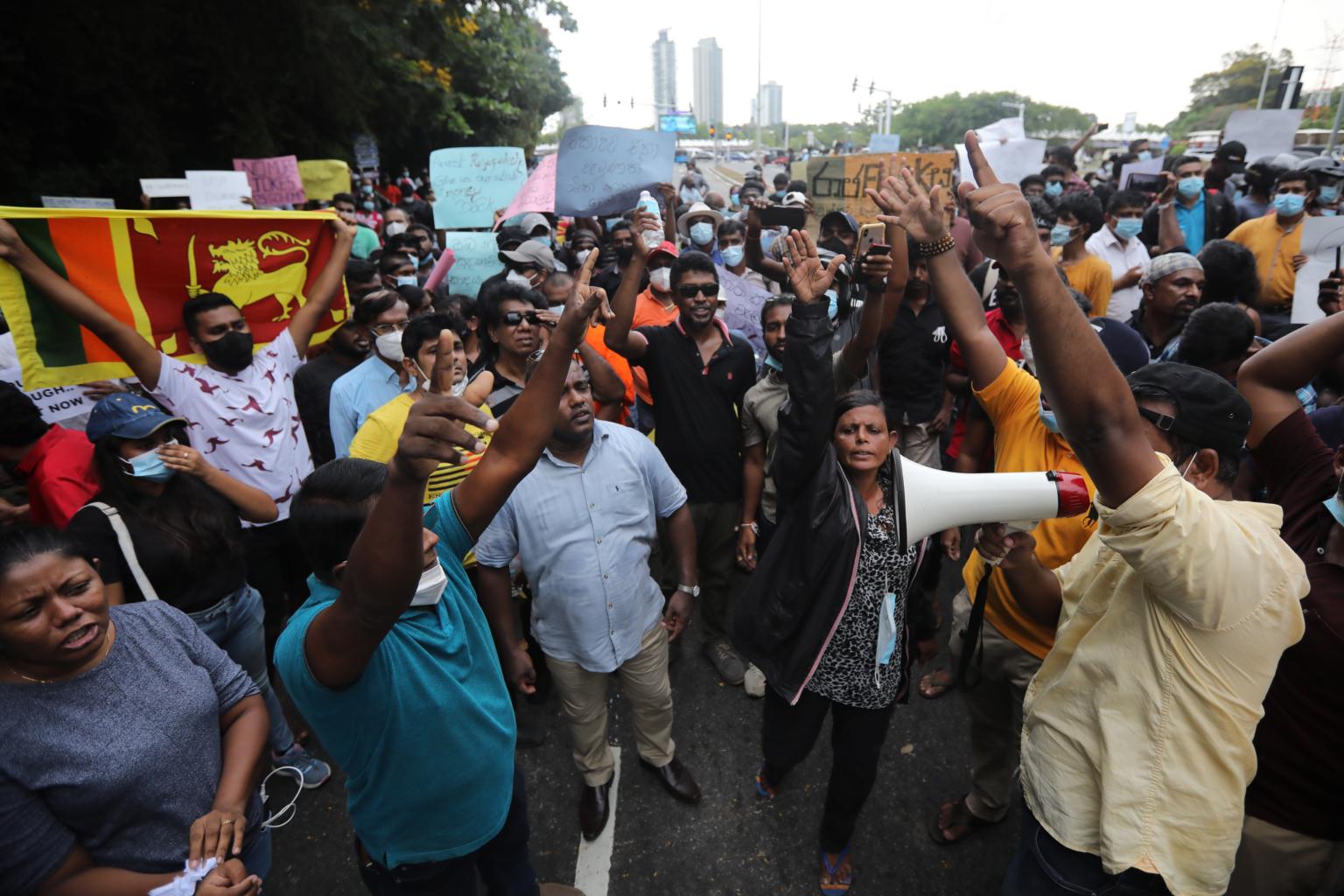Sri Lanka president wields power with naming of debt crisis panel
Sign up now: Get insights on Asia's fast-moving developments

People protesting outside the Parliament complex in Colombo, Sri Lanka, on April 5, 2022.
PHOTO: EPA-EFE
Follow topic:
COLOMBO (BLOOMBERG) - Sri Lanka’s president named an advisory panel to help resolve a growing debt crisis and engage with lenders, including the International Monetary Fund, signaling he remained in control despite his government losing its parliamentary majority and calls for his resignation.
Mr Gotabaya Rajapaksa used his sweeping executive powers to name the group made up of economists and fiscal experts to advise him, after his new finance minister resigned within 24 hours and the opposition rejected his invitation to join an interim government.
The new presidential advisory group will "provide guidance that will address the present debt crisis and lead towards sustainable and inclusive recovery for Sri Lanka", Mr Rajapaksa’s media office said in a statement late on Wednesday (April 6).
The move signals that Mr Rajapaksa, a former military officer, has turned his focus to steering the country through US$8.6 billion (S$11.7 billion) worth of debt payments due this year and Asia’s highest inflation, confident that he will remain in power given the lengthy parliament and legal process to oust him.
Mr Rajapaksa, who often rules by issuing gazettes late at night, has yet to address the country and parliament on economic and political situation.
Over 40 lawmakers from the ruling coalition said they will vote as independents, leaving the government with less than the 113 needed to maintain a simple parliamentary majority.
Mr Rajapaksa’s remaining lawmakers said he will not resign under any circumstance and the speaker, a Rajapaksa ally, earlier rejected the opposition’s proposal for parliament to ask the president to step down, saying it had no democratic right to do so.
Mr Rajapaksa’s remaining lawmakers said he will not resign under any circumstance and the speaker, a Rajapaksa ally, earlier rejected the opposition’s proposal for parliament to ask the president to step down, saying it had no democratic right to do so.
The opposition also wants to push for a change to the country’s constitution that will limit Mr Rajapaksa’s wide-ranging executive powers, which include calling for elections mid-way through a five-year parliament term and appointing and firing government officials and judges.
Mr Rajapaksa repealed a five-day-old emergency order as crowds of protesters defied the proclamation that had given him sweeping powers to detain people in favor of a less heavy-handed approach.
Mr Rajapaksa repealed a five-day-old emergency order as crowds of protesters defied the proclamation that had given him sweeping powers to detain people in favor of a less heavy-handed approach.
Protests have largely been peaceful although there have been reports of police firing tear gas and water cannons in Colombo over the past week.
The interim government, hastily formed after the entire cabinet resigned earlier in the week, now consists of the president’s brother Mahinda Rajapaksa as prime minister and three other ministers.
There’s speculation that new cabinet ministers will be appointed, local media reported, after the prime minister held meetings with ruling party lawmakers at his home on Wednesday.
In the mean time, the country's Presidential Advisory Group on Multilateral Engagement and Debt Sustainability held discussions with the president on "key matters in going forward with the IMF program" and will continue to be in regular communication, Mr Rajapaksa’s media office said.
The group members include Mr Indrajit Coomaraswamy, a former governor of the Central Bank of Sri Lanka and Dr Shanta Devarajan, a professor at Georgetown University’s Edmund A. Walsh School of Foreign Service and a former senior director of development economics at the World Bank. Ms Sharmini Coorey, a former director of the IMF’s Institute of Capacity Development, is also part of the panel of experts.
Among its debt payments due this year, the South Asian country needs to honour a combined US$2.2 billion of principal and interest payments for dollar-denominated bonds and loans, with the number rising to about US$2.7 billion annually in both 2023 and 2024, available data compiled by Bloomberg show.
Global investors are scrutinising the island nation's ability to weather its debt challenge after dwindling foreign reserves prompted a slump in its currency - with surging living costs and power cuts triggering big protests.
Worsening political upheaval following a cabinet reshuffle and the resignation of the central bank chief is contributing to uncertainties.
Sri Lanka had about US$2.3 billion of foreign reserves in February. It faces an imminent test of global investor confidence on April 18, when US$36 million in interest on a 2023 dollar bond and US$42.2 million on a 2028 note both come due, Bloomberg-compiled data show.
A US$1 billion sovereign bond maturing July 25 presents a bigger challenge.
"To get out of the crisis, the quick establishment of an effective government should be the first priority. Clinching a deal with the IMF should be next," Bloomberg Economics' economists Ankur Shukla and Abhishek Gupta wrote in a note on Tuesday.
Sri Lanka also needs to seek help from neighbors India and China, as well as opting to restructure its dollar debt, Bloomberg Economics said.
"If the above steps do not secure enough dollars to finance debt repayments as well as imports in the near term, we think the government will prefer to default on its debt and use the available dollars to import food, fuel and other essentials," the economists said.
Some remain sanguine. New York-based Neuberger Berman, an investor in Sri Lanka's sovereign dollar bonds maturing this year, said it will continue to hold the notes due in July with the belief that the country will come to agreement with the IMF.

